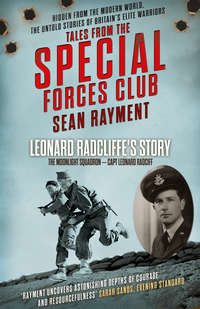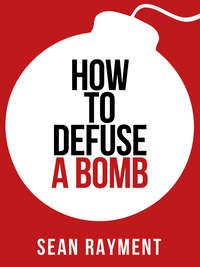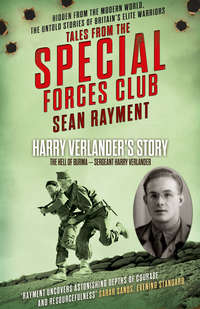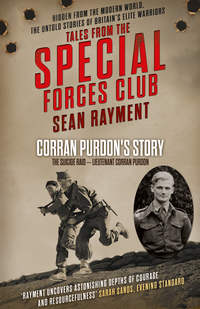
Полная версия
Tales from the Special Forces Club
‘Once I had gone through the door and was outside, that was it, he had lost me. Even if he realised what had happened, by the time he got outside I was gone. It was tremendous fun and, although in many respects it was a bit of a game, it was also deadly serious. You couldn’t have an agent who stuck out like a sore thumb, either because he was just being clumsy or because he was being too suspicious, so the trick was to act as normally as possible and to try and blend in. There were some who were very good. In some cases you would report back and say, “He didn’t turn up,” and the instructors would say, “Ah, but she did.”
‘One of the other key skills an agent had to be adept at was using “live” and “dead” letterboxes – the passing of messages. A message might read: “Somebody will be sitting on a bench in the pier gardens about 11pm or 3pm and he’s got a message for you,” and you’d have to hope that somebody else, not a person taking part in the exercise, hadn’t got on the bench too, because that could be a bit confusing.
‘You’d be told that the contact would be reading a newspaper, so you would go and sit down and take out a cigarette – I’ve never been smoker but I didn’t mind puffing away – and he would fold up the paper and put it down and I would pick it up, and that was quite normal because there were very few papers published and it was first come, first served, and everyone wanted to read a paper, so if you saw a paper lying around you always picked it up.
‘We would also pass messages in cinemas and tea rooms, which was quite difficult because you had to make sure you found the right person, especially if you were a woman. If you started passing messages to a strange man you could be had up for soliciting, so you had to make sure you were giving the messages to the right person.’
Noreen also had to become proficient at the so-called ‘honey trap’, a tactic in which female agents use their feminine allure to ‘convince’ enemy agents to confess or at least admit their activities. It was a demanding task, not least because if Noreen was successful it might mean the end of an agent’s career even before it had begun. Curiously, some male agents did give some indication that they were involved in covert activities, often within just an hour or so of meeting Noreen.
‘During this stage of the training we would work very closely with the students’ conducting officer. He wasn’t part of the Beaulieu staff, instead his job was to act as a sort of mother hen to the students, giving them a bit of inspiration when needed but also listening to their troubles and soothing their fears, reassuring them, when needed, that they were up to the task and also explaining the risks of the job. I think that certainly some of the students, as time went on and news came in of field agents who had been captured and killed, would think about their own mortality – that was only natural. There was nothing wrong with agents worrying about being killed; at the very least it demonstrated that they had grasped the reality of what they were about to do.
‘Of most concern, however, were agents who might talk or give away what they were up to, either by boasting or through fear or torture, and who might display characteristics which would ultimately compromise their role. The conducting officer would sit in on various exercises and watch the students, and he would pick out anybody he thought might be likely to talk. This wasn’t a test which all of them had to pass. He would approach one who he thought might be a bit suspect and say, “Let’s go out for a drink, or dinner or something – you’ve been working hard and deserve a bit of a break.” He would often do this to students, so there was nothing that unusual in it.
‘Together, the conducting officer and I would act out a couple of different scenarios which we had worked out beforehand, planning down to quite a lot of detail. One was known as the Royal Bath Dinner, named after the hotel where we often worked. I also worked at the Lincoln Hotel, but I preferred the Royal Bath because it had a terrace off the dining room and if there was a full moon shining on to the sea it was very romantic and much easier for me to work.
‘The two men would go off and have dinner and I would wander into the dining room out of the blue and the conducting officer would say, “Oh, Noreen, what are you doing in Bournemouth? How lovely to see you.” He would explain that I was some old friend of the family or something believable and would then ask me to stay for dinner. And the three of us would chat for a while and then someone would come along and say to the conducting officer, “Sir, there is a phone call for you” or something like that, and he would return and say, “I’m frightfully sorry, I’ve been called away, but you two stay here and have some fun and if I can I’ll come along and join you later.” And that’s how it began.
‘We had another scenario where he would say to one of the agents, “I met a girl today, I used to be at school with her brother, and I’ve invited her to join us for a drink.” And the students never minded. Well, the Brits minded a bit, because they were looking forward to a good old boozy evening and along came this blasted woman who was going to spoil everything. But agents with other nationalities were very accommodating, they quite liked it because they didn’t get the chance to meet many English women, so they were quite pleased.
‘I found that the Brits didn’t talk much. My job was to try and get them to talk. The Brits were very stuffy and came out with a series of stories without actually saying anything. One told me that he was a representative for a toothpaste company, which was a bit daft because we didn’t have any toothpaste, we used to clean our teeth with soot or salt. They pretended they were all sorts of things, but the most obvious excuse they gave was that they were on a very boring course with the War Office. The clever ones would always try and steer the subject of conversation back to me, so that I had to talk about myself or what I did, so I had to be careful too.
‘But the foreign agents were different, especially the younger ones. I think they were lonely, they were often far from their families and their culture – it was isolating for them. It must have been very flattering for them to have a young English girl chatting away to them, hanging on their every word. I remember one, a Dane, a beautiful blond Adonis. I managed to get him out on to the terrace – he didn’t need a lot of persuading actually, I think he was rather taken with me. I weighed about 18 kilos less then, and didn’t have white hair, and I didn’t need glasses in those days.
‘As we chatted on the terrace, he asked me if we could spend Sunday together. I took a little persuading, just so that he didn’t get suspicious, but I knew of course that we couldn’t. I became a very accomplished liar, I lied to everyone – my family, my friends – I just lived a lie. But once he said that, I felt a real surge of adrenaline because that was my lead, it was wonderful feeling that I might be on to something. I said, “Yes, I’d love to meet up on Sunday. But what is going to happen afterwards? Am I just the sort of thing you pick up on one day and then off you disappear, or are you going to be around?”
‘He looked slightly crestfallen and told me he was going away, so I responded, “Oh, you’re going away. Well, where are you going? Could we write? Could we meet again? I don’t particularly want to get involved unless we could meet again.” This went on for a while as we chatted over coffee and perhaps a whisky or two. After a while he told me that he would be going back to Denmark, which at the time was still occupied by the Nazis – and the only people who did that sort of work were agents. It was almost like a bit of a confession or perhaps he just wanted to unload some of his concerns. He said, “I won’t be able to write, I won’t be here, I’m being repatriated back into my country.”’
The Danish agent had committed a cardinal sin. Although the trainee spy hadn’t actually admitted that he was a member of the SOE, he had provided a clue, and in the world of espionage that is often all that is needed. Had his admission been made in the field he could have jeopardised himself, his team and an entire network, leading to the deaths of hundreds of men and women.
‘I felt terrible when he said that, because I knew I was going to have to betray him. That was my job – it was the sort of job you hoped you would never succeed at. It was exciting up until the end, when you felt awful. But the reality was that I was helping to save the agent’s life and possibly the lives of many others. It was a horrible job but it had to be done.’
Noreen kept up the pretence all evening, which ended with a gentle kiss on the Dane’s cheek. The student spy returned to his quarters while Noreen headed straight to her house to write up her report. Once written, it was submitted that same evening to the debriefing officer, Colonel Woolrych, known to everyone as ‘Woolly Bags’, an intelligence specialist who had served in the First World War and later went on to become the commandant at Beaulieu.
‘Like many people in that world, Woolrych didn’t suffer fools gladly, but I found that he had a very compassionate side. All the reports from all the different spy schools were sent to Woolly Bags. He then made an assessment and sent the final report to the head of section. For French students it would have been Buck, and he would have the final say as to whether the student should be sent into the field. But if someone had spoken about their role, that was a very different matter.
‘The following morning I was called into an office, and sitting there was the Dane. I stopped in front of him and we both looked at each other and I think it slowly began to dawn on him what had happened. At first there was a look of confusion and then, when Woolly Bags said, “Do you know this woman?” the look on his face turned to complete hatred. On previous occasions when I had done this, I had found that most of the students took it well, even if it meant that their careers in the SOE were compromised. But the Dane was different.
‘He leapt to his feet with this infuriated look on his face and he said, “You bitch!” Well, no woman likes to be called a bitch. I was quite upset. I was then asked to leave the office and the two officers continued with the debriefing.
‘Afterwards I was called back into Woolly Bags’ office and in his very blunt way he said: “There’s no point being upset about it. If he can’t resist talking to a pretty face in Denmark he won’t last an hour. He more or less told you that he was going to be an agent after dinner and a few drinks. Imagine what you could get out of him if you had a week, or if he was threatened with torture or execution. And remember it’s not only his life he’s putting in danger, he could bring down an entire network.” I did realise that, of course, but Woolly Bags’ words were of little comfort to me. The poor chap had gone through six months of very tough training, and Beaulieu was by no means a holiday camp.
‘Beaulieu was known as the Finishing School for Spies – it was where everything they had learnt for the last six months was supposed to come together, so that the agents could deploy into the field and hopefully survive and carry out the tasks for which they had been trained. But it was also a very tough place, and if the students weren’t up to the task then they could be failed at any moment. Some students were failed on the last day because the instructors could not be sure that they would survive as an agent.
‘But Buck could be very generous – and even for those students who talked it didn’t always mean the end. Buck used to say, “They’ve learnt their lesson, they won’t do it again.” Of course Buck had to be absolutely sure about this, because it was his reputation on the line also. His attitude was that lots of agents made mistakes in training, and it was better to make the mistakes in training rather than on an actual live mission. But this attitude was always a risk and I’m not sure that the other section heads had such an enlightened approach as Buck.’
Noreen never saw the Danish student again and never discovered whether he actually became a spy.
* * *
The students at Beaulieu were also taught how to pick locks and enter buildings and factories without being heard or seen. The instructors were former spies, but some rehabilitated criminals, often ex-burglars, also served at Beaulieu and they were known as Method of Entry (MOE) men. One of the trainers was Johnny Childs, a lock-picker extraordinaire.
‘Johnny was always easy to recognise because he was always driving around in a truck and on the back of this truck was a huge door covered in locks – every conceivable type of lock you could imagine. His job was to teach the students how to pick the locks, so there were locks from every country, French, German, Dutch, Danish. As an agent you might have to enter a building to which you didn’t have a key – it might be in an emergency so this was a really vital art. Johnny had learnt his skills from a burglar. The story was that the burglar was serving a long stretch in Pentonville Prison.’
When the war broke out the SOE realised they needed help to enter buildings, and the experts of the trade were burglars. A senior SOE officer approached the authorities and asked for an expert burglar to be released into their care on the condition that he willingly passed on his skills – or so the story goes.
The lessons in ‘breaking and entering’ took place towards the end of the course when the students were preparing for the final exercise – a 96-hour test which all students had to pass. On one occasion Noreen was sent to accompany one of the students taking part in the exercise whose task was to travel to London and reconnoitre a certain address.
‘The student who asked me to accompany him was very dashing, a member of the Parachute Regiment, and very handsome. And so I was delighted to go along. I also thought it would be fun and a chance to be in London for a few hours. We got the train up to London and went to the address, which was in central London close to Westminster Cathedral. I thought we were just going to look at the building so that he could say he had been there, but he wanted to go up to the fourth floor, which was fine, but when we got to the door he began to pick the lock and then went inside the flat.
‘It was a Saturday afternoon, about 4pm, and I had never been so terrified in my life. He looked at me shaking and said, “Don’t just stand there dithering, come in.” I went in and I thought he was just going to have a quick look and then leave. Not a bit of it. He went into the bedroom and bounced on the bed, went into the bathroom and turned on taps, went through some drawers and cupboards. It was awful, every time we heard the lift I thought Wormwood Scrubs here we come. Then he started fiddling with the curtains, examining the photos on the piano – it probably lasted 10 minutes but it felt as if it was about four days. I was almost fainting by the end of it.
‘As part of the compensation for this ordeal he took me to an underground pub in Piccadilly where he managed to revive me. We had a few drinks and then he took me to the theatre. What amazed me, when I thought about it afterwards, was how cool he was, completely unflappable. I was almost rigid with panic and my only thought was to get out, but he was completely comfortable.’
The experience was both fascinating and frightening for Noreen, who now fully realised how agents in the field had to work under conditions of almost unimaginable stress and still be able to think clearly.
There were occasions during the 96-hour exercise when events seemed to become almost tragically real. The agents were now so close to deploying into occupied countries that they no longer regarded themselves as students – the lines between exercise and reality became blurred. One such occasion involved a French SOE member who excelled in sabotage and silent killing in training.
‘When he went on his 96, one of the decoys had been ordered by Buck to see if she could get him to talk about what he was doing. She met him in a bar, a classic scenario, and they spent the whole evening chatting, and the next day they had lunch together and went on a romantic walk together in a forest somewhere. She was chatting to him and becoming more and more romantic and they got into some sort of passionate embrace, at which point he grabbed her by the throat and began to squeeze until this poor girl almost fell into unconsciousness. At that point he released his grip and as the girl gasped for breath he said, “Now go back and tell Buckmaster to be more careful next time.”’
Everyone was fully aware of the risks involved with being an agent, although, according to Noreen, the knowledge that death and torture would almost certainly follow capture was not something anyone dwelt upon.
‘We weren’t told about deaths or executions immediately after they happened – the news sort of filtered down. For example, if a radio op came up on schedule every day and then one day he didn’t, Baker Street might suspect that he was wary that the Germans were on to him and he was trying to find a safe house. But if there was still silence after six or seven days you had to accept that he or she had been killed or captured. Everyone was obviously very sad when the news came through, but no one made a fuss. There was never any real outpouring of emotion. I think we mourned privately.
‘I always thought the work was particularly dangerous for the radio operators. They were told that they had just a 50 per cent chance of surviving the mission – imagine what that must have been like. They received no extra pay for the work they were undertaking, it would have been the same rate as anyone of equal rank.
‘The radio operators must have had nerves of steel – it was the most dangerous job, and they were highly valued and looked after very carefully. If a group lost their radio operator they lost all contact, because he was the only one who knew how to encode and decode messages.
‘The golden rule for radio operators was never to transmit for more than 15 minutes, because it took the Germans 20 minutes to get a fix on a location.
‘One radio operator told me that he had a horror of transmitting from inside a house, because he had this terrible feeling that the door would one day burst open and the Germans would catch him in the act, so to avoid this he always tried to transmit in the open. He would throw his aerial over a tree and always had two members of the Resistance with him who stood with guns at the ready and would warn him if there were any Germans approaching.’
Noreen also recalled the exploits of one agent called Benny Cowburn who was parachuted into occupied France four times between 1939 and 1941. He was awarded the MC and Bar, the France and Germany Star, the Defence Medal War medal, 1939–45, the Légion d’Honneur and the Croix de Guerre avec Palme.
Cowburn was extremely self-reliant and even used to make his own bombs. His base was a hut in the mountains.
‘Benny played a very dangerous game, because he pretended to be friendly with the Germans. He must have had a tremendous confidence in his Resistance group, because they could have shot him for being a traitor. But he became quite friendly with the Germans, and one night, when he had been busy making his bombs, at about 3am, there was a terrible banging on the door. He opened the door and the German soldiers wanted to come in for a drink and a smoke, saying words to the effect of, “What are you doing up at this time of night?” and he said, “Oh, I’m making some bombs to blow up a bridge.”
‘But the Germans didn’t take any notice because they thought he was joking, obviously, and said, “Have you got any beer?” He let them come in and gave them some beer. They asked him if he was going to have one and he said, “No, you have to keep a clear head when you are playing with dynamite,” and they all thought he was terribly funny and screamed with laughter. After they had their beer they left. I think Benny was probably the coolest man I knew.’
Noreen harboured a secret ambition to become an agent herself, but two critical facts were against her – she was too young and the war was coming to an end. The youngest female agent was Anne-Marie Walters, who was aged just 21 when she arrived in France, but Noreen was only 20 at the end of the war in Europe.
Walters was recruited into the SOE from the Women’s Auxiliary Air Force in July 1943, aged just 20. She was born in Geneva to a French mother and an English father. The family left Switzerland at the outbreak of war, and two years later Walters joined the WAAF. Her SOE codename was Colette and she parachuted into south-west France in January 1944, where she remained until the invasion of Normandy. She survived the war and was decorated by both the British and French governments for her work in occupied France.
‘One of my last memories from life at Beaulieu involved a little Cockney corporal called Frank, whose job seemed to be getting us girls out of scrapes. Frank was engaged to a girl called Doris who worked in Woolworths. On VE Day we had a party and I was staggering over to The Rings, our HQ, a rather ugly stockbroker Tudor house in the middle of the estate. I was rather worse for wear because I had danced until dawn and had a few drinks. Suddenly out of a rhododendron bush appeared Frank and he said, “As it’s VE Day, could I kiss you?” and I said, “Frank, what about Doris?” and he said, “I’ll tell her that it’s my last sacrifice for the war effort.” Not really very flattering for me.’
As the Allied forces began pushing through France the need for agents to be sent into Europe decreased rapidly, but there was still a need for volunteers for service in the Far East, especially Burma, where Force 136, also part of SOE, were harrying the retreating Japanese.
‘We all knew that the war in Europe was coming to an end. By the end of 1944, or even as early as D-Day, there was a certain inevitability about it. But when the end came at Beaulieu it was all a bit sudden. But there was still a war to be fought in Burma and I hoped to be sent there. In fact I was actually on embarkation leave when the atomic bomb was dropped in August 1945.
‘By October 1945 Beaulieu had pretty well closed down, and by January 1946 SOE had ceased to exist. MI6 didn’t like the organisation, I think they saw SOE as a threat to their existence, and after all both organisations were competing for the same meagre resources. We in SOE all knew that MI6 regarded us as a “load of amateur bandits” – well, we were all amateurs and we were bandits. SOE was made up of lawyers, accountants, teachers, businessmen, bankers and future housewives. None of us were professional spies, but I think we were pretty good at what we did.’
Noreen had left the SOE in September 1945 and, like all agents and members of the organisation, she was sworn to secrecy. They were ordered to sign the Official Secrets Act and effectively told to keep their collective mouths shut.
After the war she put her language skills to good effect and joined the BBC’s French Service, where she remained for five and a half years.
‘Occasionally you would come across an agent from F Section, and we would acknowledge each other and perhaps have a quiet word over lunch or a cup of tea in the canteen, where we’d talk about our time in SOE and catch up on news of old friends such as Harry Ree,‡ Eddie McGuire, George Millar, Odette Churchill, Peter Churchill and Bob Maloubier.
‘Then one day Buck turned up and it was a bit like being back on home ground. Some time later my future husband, Jacques, arrived at the BBC. Jacques had served as a captain in the French 1st Army and under Général de Lattre de Tassigny with the 19th battalion of the Chasseurs Alpins, and was awarded the Croix de Guerre with Bar. We got to know each other and we later married and I moved to France, where I have now lived for 56 years.’
Noreen remains an active member of the Special Forces Club, regularly attending reunions and meetings, where she often hears previously untold stories from her former colleagues of 70 years ago.
* First Aid Nursing Yeomanry.







